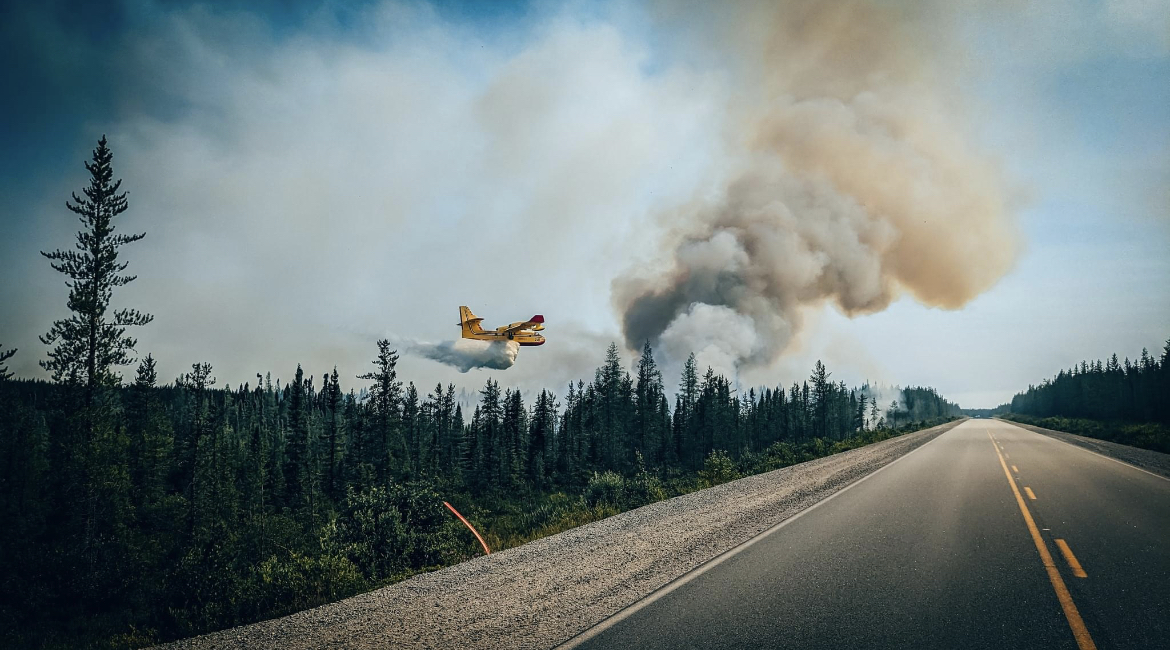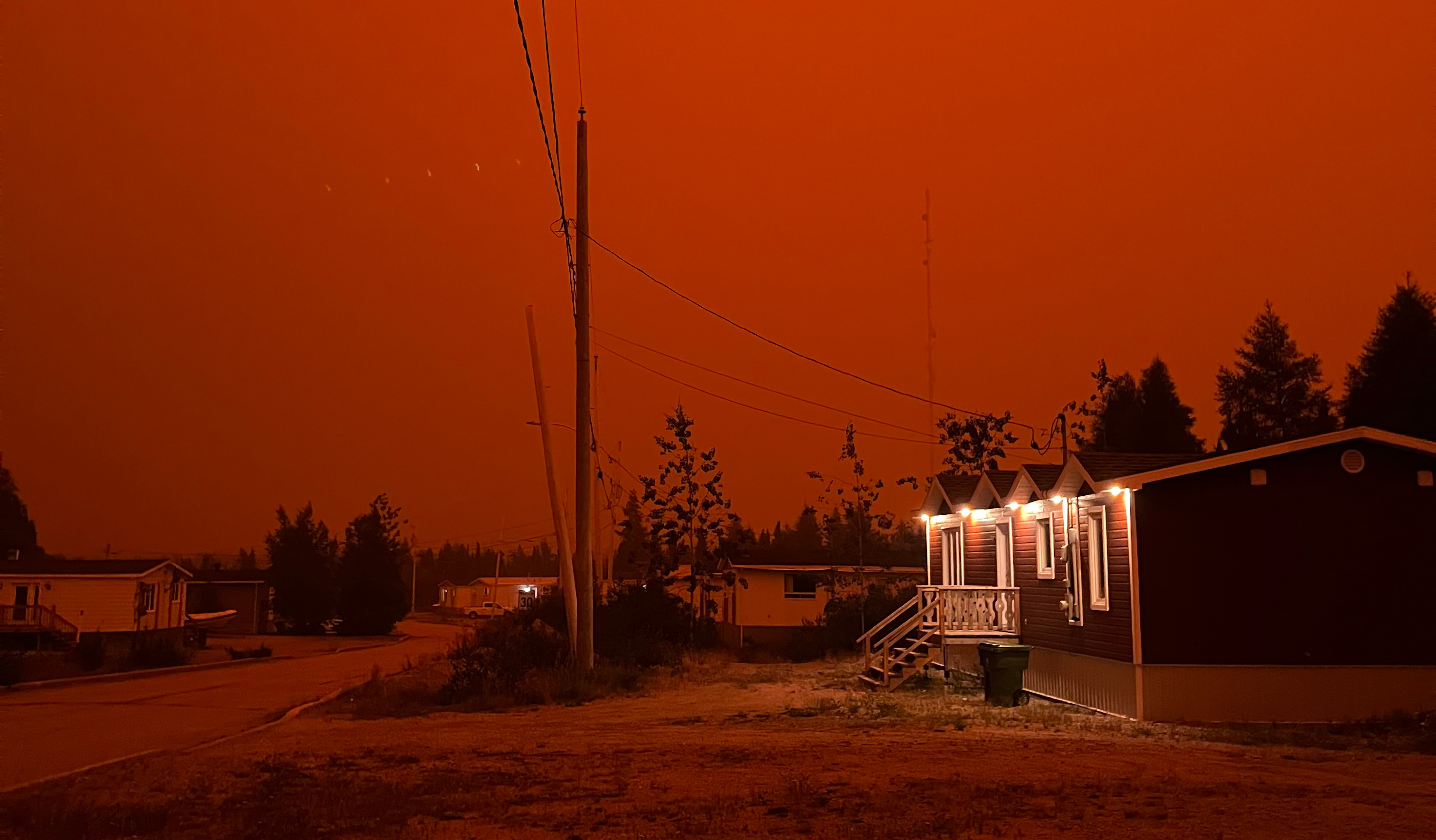







April 29, 2024
As Canada’s air navigation service provider, NAV CANADA is well-acquainted with maintaining safe skies through hazardous weather events. The summer of 2023, however, will be remembered as a season of exceptional challenges, as wildfires of unprecedented scale and intensity swept through parts of the nation.
They not only threatened the natural landscape, but they also impacted the company’s operations and how we support communities and our employees, namely those in regions that don’t regularly experience wildfires. As we prepare for what lies ahead in summer 2024, we’ve taken a look at the challenges we confronted in 2023 and the collective efforts and resilience of the people who got us through trying times.
In the heart of the La Grande Rivière region in Quebec, Isabelle Lanouette, a NAV CANADA Team Supervisor with a decade of experience, found herself at the forefront of an unprecedented challenge. The La Grande wildfire, which began in early May across the extended region of James Bay, took an ominous turn for La Grande Rivière on Friday, July 14. The fire, closing in on the airport, was expected to engulf the critical transport lifeline the following day.
“It was a surreal scene with orange skies and pitch-black days,” says Lanouette.
Her team, stationed at the fly-in fly-out site, operated on a unique schedule of three weeks on and two and a half weeks off, with alternating day and night shifts. A small but dedicated group played a vital role in ensuring the smooth flow of air traffic in the region.

Photo captured by Isabelle Lanouette, May 2023.
With road closures affecting the supply chain, fuel, food and other essentials became scarce, especially since roads had been closed for nearly a week at that point. While SOPFEU (Société de protection des forêts contre le feu) was fighting the fires, the threat intensified and the city decided to evacuate all residents, approximately 200 people, along with Hydro Quebec crews and NAV CANADA personnel. An evacuation plane transported everyone to safety in Montreal.

Photo captured by Isabelle Lanouette, May 2023.
For the first time in its history, the La Grande Airport faced a complete shutdown. Lanouette and her team grappled with the challenge of adapting to a site closure, necessitating the creation of new procedures. Daily meetings with the city, community representatives, Hydro Quebec, and NAV CANADA were imperative for informed decision-making during this critical period.
After six days of closure, the airport cautiously reopened. Fortunately, the airport infrastructure remained unscathed by the fires and the lifeline provided to the region by the aviation industry was restored.
Amidst the ongoing fire response activities, the airport witnessed a surge in movements, with helicopters and SOPFEU personnel contributing to the bustling atmosphere. Although the fire was still active, the immediate threat had dissipated, allowing the team to resume operations and contribute to the recovery and stability of the La Grande Rivière region.
As the days passed, wildfires persisted with intensity and unpredictability in other parts of the country, testing our adaptability and response capabilities.
Wildfires impact our dedicated team of professionals, including air traffic controllers, flight service specialists, technologists, and support staff. Last year showed how they adapted rapidly to changing conditions and evolving emergencies.
The role the company plays during wildfires emphasizes the adaptability, responsiveness, and expertise that enable us to keep Canada’s skies safe for all. This includes supporting fire suppression activities, providing weather briefings, and collaborating with government officials and local authorities, as well as keeping our assets, like navaids and facilities, safe.
The lessons learned and experiences gained during this challenging period will undoubtedly strengthen our ability to face future crises with the same level of professionalism and determination.
Canada had a record-breaking year in terms of wildfires in 2023. The fires torched 6.9 times more hectares of land than an average year, equating to an area larger than Greece and more than doubling the previous record set in 1989.
The wildfires were also more widespread than usual, with fires reaching forests in the western, eastern, and northern regions of Canada. Quebec saw double the likelihood of extreme fire weather conditions and the largest single fire ever recorded in southern Quebec.
"As we continue to see projections for more intense and frequent natural disasters, being prepared is no longer a ‘nice to have’, it has become imperative to the company’s resiliency and preparedness in the continuity of the services we provide,” says André Charron, Director of Security & Emergency Planning at NAV CANADA. “We are seeing more climate hazards occurring simultaneously or in quick succession, which has resulted in an enhanced focus on our disaster and emergency planning activities."
Looking to the future, Charron adds that many of the events and lessons learned in 2023 will help the company increase its resiliency and readiness to respond to challenges, fortifying its ability to adapt and thrive.